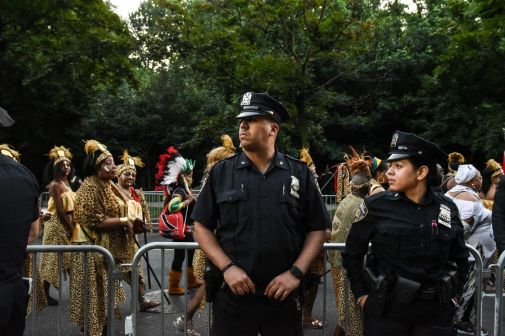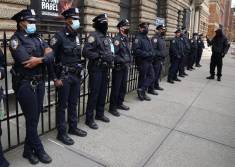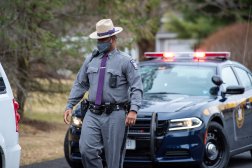NYPD nearly ready to close comment period on body camera pilot program

The New York City Police Department is nearly ready to stop accepting public comments on its body camera program, as it prepares to deploy 1,000 cameras around the city this fall.
Since late June, the NYPD has been working with researchers at the Policing Project at New York University’s School of Law to accept comments online on the policy they’ve drafted to govern the city’s expanded pilot program. NYU’s analysts originally planned to close the comment period on July 31, but extended it to Aug. 7 to be sure they heard from all corners of the city.
“This project is groundbreaking in its scope, and can serve as a model for other police departments throughout the country,” Barry Friedman, the policing project’s director, said in a statement. “If the NYPD can solicit public comment in this way, every department can.”
The group’s website includes a 22-question survey covering aspects of the policy and space for people to upload their thoughts separate from that questionnaire. The researchers are chiefly interested in the new policy the department has developed for the program, posting a summary of it and the full document on a website dedicated to gathering feedback.
The NYPD has been using the cameras in a limited capacity since a federal judge ordered the department to begin testing the technology in 2013. But with plans to start aggressively expanding the city’s pilot program in the coming months, the department turned to NYU for help soliciting comments on the cameras.
In all, the draft policy contains provisions detailing how officers should use the technology, and how the department should manage the footage the cameras produce.
Specifically, it dictates when officers have to turn their cameras on, stipulating that they have to start recording when responding to a crime in progress, during a stop and frisk, or any other kind of search and anytime they use force. It also bars officers from recording in some situations, such as during public demonstrations or while interviewing a confidential informant or victim of a sex crime.
The policy requires the department to keep recordings for a minimum of six months, and proscribes different retention periods if the footage includes sensitive incidents like an arrest or use of force.
When it comes to who can view the footage, the policy allows anyone hoping to file a complaint about an officer to view video of the incident in question before doing so. It also states that people would be able to request the footage under New York’s public records law, though it contains a specific provision regarding “high-profile incidents.”
“When there is a high-profile incident, such as an incident involving a serious use of force or death in police custody, the NYPD expects to confer with the attorney general or a district attorney about releasing the video to the public in order to balance the public’s right to information with the integrity of any criminal investigation or criminal prosecution,” the policy reads.
Under the draft policy, the department would also allow officers to view their own footage, allowing them to watch the videos before making any formal statement about an incident. However, officers would have to get a supervisor’s permission to view footage before making a statement about any incident where they’ve used “physical force readily capable of causing death or serious physical injury” or fired a weapon.
[Read more: State lawmaker aims to set up NYC police body camera pilot program]
Even with that provision, some civil rights advocates have already expressed their displeasure with that section of the policy.
The Leadership Conference on Civil and Human Rights regularly works in conjunction with the technology policy consulting firm Upturn to evaluate police body camera policies around the country, and submitted comments to NYU specifically highlighting their opposition to officers getting to view footage ahead of giving any statement.
The New York Civil Liberties Union was similarly critical of the provision, according to a copy of the group’s comments a spokesman for the group provided to StateScoop.
“The NYPD’s policy must be modified to include a prohibition on viewing [camera] footage until after the completion of any required reports or the providing of an official statement related to an investigation,” the NYCLU wrote. “These changes are necessary in order to prevent further erosion of public trust in the credibility and effectiveness of NYPD disciplinary investigations.”
Additionally, the civil liberties group charged that a clear statement laying out that officers would be subject to discipline if they violate the policy’s tenets is “entirely absent” from the draft. They also call for the department to revise the policy to require filming only “interactions with the public that have an investigative or law enforcement purpose.”
The leadership conference’s advocates are also frustrated that the policy doesn’t put any limits on the department using biometric technologies in conjunction with the cameras, since they feel the use of something like facial recognition software would “raise significant surveillance concerns.” Additionally, the group is concerned that “while the proposed policy is available on the NYU Policing Project’s web site, it is nowhere to be found on the NYPD’s own site.”
However, the analysts did praise the department for providing clear guidelines dictating when officers should turn their cameras on and for including restrictions on recording “certain vulnerable individuals, as well as anyone engaged in First Amendment activity.”
Once the comment period closes, the NYU researchers will prepare a summary of the feedback for the department. The NYPD will then issue their own public response, detailing what changes (if any) they’ve made to the policy in response to that input.





